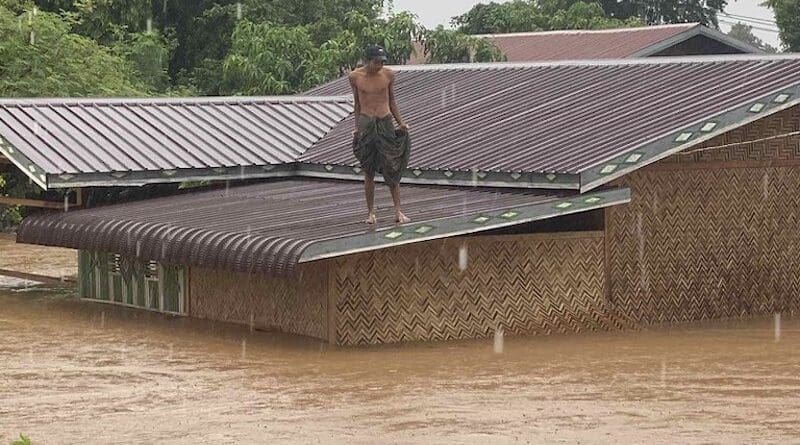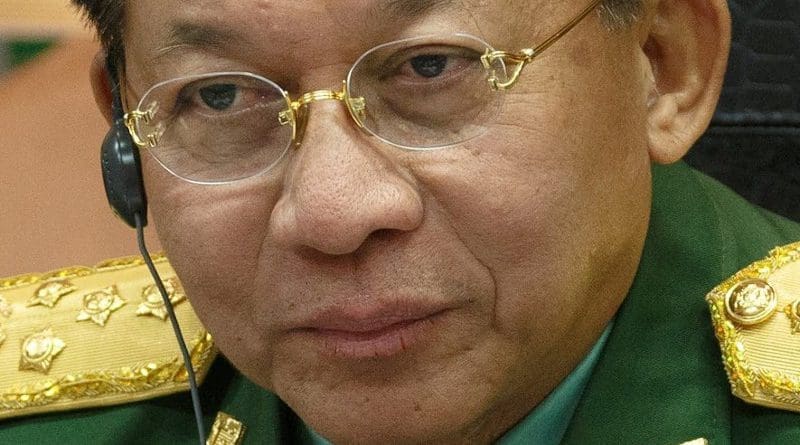
A man stands on a home surrounded by floodwaters in Kyoet Kone village in Tatkon township in Naypyidaw on Sept. 11, 2024. (RFA, Citizen Photo)
September 23, 2024
By James Shwe
As the floodwaters of Typhoon Yagi recede in Myanmar, they reveal more than just physical devastation. They underscore an ancient belief ingrained in Chinese and Southeast Asian Buddhist-Hindu traditions: poor governance invites nature’s wrath.
For millennia, these cultures have held that unjust rulers bring about droughts, famines, and disasters. Central to this belief is the Chinese concept of the “Mandate of Heaven” (天命, Tiānmìng), which holds that rulers are granted divine authority only as long as they govern justly. Heaven withdraws its mandate when rulers fail, often manifesting displeasure through natural disasters.
The term “tian zai” (天災), meaning “heavenly disaster,” embodies this belief—that calamities are divine retribution for failed governance.
In the wake of Typhoon Yagi, with over 300 dead, hundreds missing, and more than 630,000 affected, this ancient wisdom feels eerily prophetic. Over 2,000 houses have been destroyed, thousands more damaged, and 1,000 schools and 370 religious buildings lie in ruins. The agricultural sector, a lifeline for millions, has been particularly devastated, with over 640,000 acres of farmland destroyed.
The military junta’s mismanagement of Yagi echoes its disastrous responses to Cyclones Nargis in 2008 and Mocha in 2023. Once again, the regime has turned a natural disaster into a man-made catastrophe by obstructing aid, delaying visas for relief workers, and prioritizing political control over human lives. The junta’s failures as stewards of the land and its people are glaring, and the preventable nature of these disasters should serve as a wake-up call for change.
But their guilt runs deeper than disaster response. For decades, the military’s greed and corruption have laid waste to Myanmar’s environment. Forests once covering 70% of the country have been decimated by military-backed illegal logging operations, leading to environmental degradation and making the land vulnerable to flooding and erosion. These are not merely natural disasters but the consequences of a regime’s reckless exploitation of the land.
The junta’s economic policies, focused on self-enrichment, have stunted national development, leaving infrastructure woefully unprepared for disasters. While neighboring countries invested in flood control, early warning systems, and resilient infrastructure, Myanmar’s progress has stalled. Poverty, which had dropped to 25% in 2017, doubled by 2022, a direct consequence of the junta’s mismanagement. The country’s economy has contracted by 10% since 2019, and this year, it is forecast to grow at a dismal 1%, with nearly half the population living in poverty. These figures tell the story of a nation struggling under political instability, economic hardship, and environmental catastrophe.
Typhoon Yagi only compounds this dire situation. Inadequate urban drainage worsened the flooding, while the junta’s underinvestment in emergency services crippled rescue efforts. The regime’s obsession with control led to blocked communications during the disaster, further isolating affected communities from help. These actions reveal a state more concerned with maintaining power than saving lives.
Meanwhile, resistance forces and civil society networks have risen to the occasion. For instance, the United League of Arakan (ULA) evacuated communities ahead of Cyclone Mocha and has played a crucial role in the current relief efforts. These grassroots organizations embody the ideals of responsible governance that contrast with the junta’s disregard for its people. During Yagi, the junta failed even to issue storm warnings or coordinate rescue efforts, exacerbating the disaster by opening dam floodgates without warning.
Paradoxically, the junta has appealed for international assistance while simultaneously blocking its delivery, particularly in resistance-held areas like Kayah and southern Shan states. Disturbingly, the regime continues to bomb and shell rebel-held towns in Northern Shan state, using its aircraft for attacks rather than rescue missions.
The international community has responded with aid pledges, and Singapore and India have already made air delivery, but the junta’s restrictions render much of it ineffective. While some aid has reached junta-controlled areas, many regions remain isolated due to communication blackouts. The junta’s politicization of humanitarian assistance is not only morally reprehensible but also a violation of international humanitarian law.
This situation demands a radical rethinking of how aid is delivered to Myanmar. Neighboring countries should consider cross-border operations to assist directly to resistance-held areas. International actors must bypass the junta wherever possible, coordinating with local resistance authorities and civil society networks that have proven more capable and trustworthy. Additionally, sustained pressure must be applied to the regime to lift aid and communication restrictions. The lives of millions are at stake.
The aftermath of Typhoon Yagi is a clarion call for immediate humanitarian intervention and long-term strategies to address Myanmar’s environmental and developmental crises. However, these solutions cannot be realized under a regime that prioritizes self-preservation over the welfare of its people. The junta’s contradictory stance—requesting aid while obstructing its delivery—reveals its fundamental illegitimacy and inability to govern.
As the waters of Yagi recede, they leave behind a stark reminder of the urgent need for political change. The international community must recognize that providing aid through the junta risks legitimizing a regime that has consistently prioritized military enrichment over ecological and human development. The compounding crises of conflict, poverty, environmental destruction, and natural disasters call for a new approach to aid—one that supports local actors who embody principles of responsible governance and environmental stewardship.
In both traditional belief and modern reality, the junta has lost its mandate to govern. It is time for the international community to act accordingly, to empower the people of Myanmar, and to hold the regime accountable for the suffering it has caused.

James Shwe
James Shwe is a Burmese American Engineer residing in Los Angeles, California, USA. He was born in Yangon, Myanmar in 1954 and has been residing in the US since 1984. He is a Registered Professional Mechanical Engineer in California. He owns and operates a consulting engineering firm in Los Angeles.
No Limits To The Lawlessness Of Myanmar’s Predatory Military Regime – Analysis

Myanmar's military junta leader, General Min Aung Hlaing. Photo Credit: Mil.ru
September 23, 2024
By RFA
By Zachary Abuza
Having illegally seized power and overthrown a democratically elected government, Myanmar’s military was never expected to hold itself up to the rule of law.
But given their losses since a trio of rebel armies launched Operation 1027 nearly a year ago, the military has acted with an even greater degree of desperate and callous criminality.
The U.N. The High Commissioner for Human Rights released a new report that recorded a 50% increase in civilian deaths from April 2023 to June 2024, year on year.
In addition to the more than 2414 civilians killed, the report detailed the deaths of 1,326 people, including 88 children and 125 women who died in military custody since the February 2021 coup.
The report documented executions, egregious sexual violence, and routine torture. Those who survived government custody described harrowing conditions in prisons and military detention facilities.
Now there are leaked reports on pro-regime Telegram channels that the military government is preparing to execute five anti-regime activists as early as next week.
That would follow the shocking executions of four, including Kyaw Min Yu (Ko Jimmy) and Phyo Zeya Thaw, in July 2022.
There are at least 112 people who have been put on death row since the coup. And the regime wants to send a signal through the executions, both to domestic and foreign audiences, that it is still firmly in control, despite losses on the battlefield.
War crimes are the strategy
The world has become inured to the intentional bombing of civilians, the execution of POWs, and the mass arrests of citizens as a form of collective punishment. Over 27,000 people have been arrested since the coup.
Junta troops torched more than 1,050 houses in retaliatory arson attacks in Sagaing, Magway and Mandalay regions in the first half of 2024 alone.
Radio Free Asia has documented a stepped up aerial bombing campaign leading to increased civilian casualties.
This should come as no surprise. The military’s counterinsurgency doctrine, known as the “Four Cuts” – stopping food, funds, information and recruitment to insurgents – is predicated on the intentional targeting of civilians as a deterrent for lending support to anti-regime forces.
War crimes have always been the milirary’s strategy, and troops are indoctrinated and encouraged to commit them, including rape.
The military is fighting across six distinct battle grounds, and has suffered losses in all of them. It has lost control over 60% of the towns in northern Shan state alone.
Opposition forces now control key roads and riparian ports, making the movement and resupply of troops difficult. The only way that the military can retaliate is through aerial bombardment and long-range artillery strikes.
If they can’t kill the opposition forces, they will kill the populations that support them.
Preying on their own
The military’s forces have committed such egregious human rights abuses that it’s hard to feel sorry for them. But their predatory behavior starts with plundering the income of their own troops.
Despite their paltry salaries, troops are compelled to make monthly contributions to the sprawling military-owned conglomerate Myanma Economic Holdings Ltd (MEHL). The amount differs based on rank, but all must pay.
At the end of the year, MEHL is supposed to pay troops a dividend. Yet nothing has been paid since the coup, a result of nationwide boycotts of military-produced products and services.
The military insurance plan is even more egregious.
Established in late 2012, by Min Aung Hlaing’s son, Aung Pyae Sone, by 2015 the Aung Myint Moh Insurance company had secured a monopoly on selling life insurance to the military, supplanting the state-owned Myanma Insurance. It has an unclear degree of military ownership through MEHL.
Even the lowest ranked soldiers are pressured to buy a minimum two-year policy costing some 500,000 kyats – $238 at the official, artificially low exchange rate – in addition to a monthly premium of 8,400 kyats.
Amid recent battlefield losses, including a large number of the hastily trained five classes of conscripts since, the company has had to pay out more than it’s taking in.
Its own capital reserves are thought to have flatlined in the overall poor economic climate and investment conditions.
As one can expect from Min Aung Hlaing’s rapacious clan, the insurance company is cheating. The firm has labeled many dead soldiers as “missing in action”.
In other cases, it has found loopholes in paperwork and nonpayment of monthly fees as justification for not honoring claims. The firm has pocketed the payments of the estimated 20,000 troops who have defected to the opposition.
The junta is flat out stealing from the soldiers that they conscript just to line their own pockets.
A well-armed extortion racket
The abject criminality of the military is getting worse.
Due to the military’s own economic incompetence, the economy has cratered. And with that has been a sharp decline in revenue needed to conduct the war.
The opposition National Unity Government’s digital Spring Lottery has significantly cut into government sweepstakes income. The loss of territory on the battlefield has cut off revenue streams.
Recent losses include four MOGE oil fields, coal, tin, lead and ruby mines. Intense fighting is underway in Hpakant in northern Kachin State for control of lucrative jadeite and rare earth mines.
Two hydroelectric dams are now in opposition hands, while others have recently fallen into United Wa State Army control.
While the capture of towns and cities along the Chinese border has led to the shutdown of many internet scam centers and the rendition of thousands of Chinese nationals, the military regime continues to rely on transnational criminal syndicates as a source for funds.
Many have moved from Laukkaing to Yangon. Others along the Thai border remain operational and under the control of pro-regime border guards forces.
Short on funds, the military has taken to shaking down local businesses. A once functioning state revenue collection system has turned into an extortion racket.
But unlike taxes that are paid on a regular basis and have a modicum of social services provided in return, the military levies are predatory and further undermine economic growth, making capital flight a rational choice for many in Myanmar.
As the country reels from Typhoon Yagi, the junta continues to blockinternational humanitarian aid workers, demanding that all donations go through the military itself.
Fearful that aid will go to opposition groups, the military is – once again – willing to deny vital food and medicines from reaching the most in need.
The war crimes are well documented, even if they have not moved the needle on international condemnation.
International actors, from China to India to ASEAN, still believe that military interests must be respected, and that the military deserves a seat at the table in any future government.
While the regime is preparing for elections under Chinese pressure as a political offramp, allowing the junta a future role is absolutely unacceptable.
For nearly four years, the military has systematically targeted its own population, engaged in egregious human rights abuses, impoverished its citizens, and transformed a once functioning state into a predatory and thoroughly corrupted crime syndicate. Zachary Abuza is a professor at the National War College in Washington and an adjunct at Georgetown University. The views expressed here are his own and do not reflect the position of the U.S. Department of Defense, the National War College, Georgetown University or Radio Free Asia.

Myanmar's military junta leader, General Min Aung Hlaing. Photo Credit: Mil.ru
September 23, 2024
By RFA
By Zachary Abuza
Having illegally seized power and overthrown a democratically elected government, Myanmar’s military was never expected to hold itself up to the rule of law.
But given their losses since a trio of rebel armies launched Operation 1027 nearly a year ago, the military has acted with an even greater degree of desperate and callous criminality.
The U.N. The High Commissioner for Human Rights released a new report that recorded a 50% increase in civilian deaths from April 2023 to June 2024, year on year.
In addition to the more than 2414 civilians killed, the report detailed the deaths of 1,326 people, including 88 children and 125 women who died in military custody since the February 2021 coup.
The report documented executions, egregious sexual violence, and routine torture. Those who survived government custody described harrowing conditions in prisons and military detention facilities.
Now there are leaked reports on pro-regime Telegram channels that the military government is preparing to execute five anti-regime activists as early as next week.
That would follow the shocking executions of four, including Kyaw Min Yu (Ko Jimmy) and Phyo Zeya Thaw, in July 2022.
There are at least 112 people who have been put on death row since the coup. And the regime wants to send a signal through the executions, both to domestic and foreign audiences, that it is still firmly in control, despite losses on the battlefield.
War crimes are the strategy
The world has become inured to the intentional bombing of civilians, the execution of POWs, and the mass arrests of citizens as a form of collective punishment. Over 27,000 people have been arrested since the coup.
Junta troops torched more than 1,050 houses in retaliatory arson attacks in Sagaing, Magway and Mandalay regions in the first half of 2024 alone.
Radio Free Asia has documented a stepped up aerial bombing campaign leading to increased civilian casualties.
This should come as no surprise. The military’s counterinsurgency doctrine, known as the “Four Cuts” – stopping food, funds, information and recruitment to insurgents – is predicated on the intentional targeting of civilians as a deterrent for lending support to anti-regime forces.
War crimes have always been the milirary’s strategy, and troops are indoctrinated and encouraged to commit them, including rape.
The military is fighting across six distinct battle grounds, and has suffered losses in all of them. It has lost control over 60% of the towns in northern Shan state alone.
Opposition forces now control key roads and riparian ports, making the movement and resupply of troops difficult. The only way that the military can retaliate is through aerial bombardment and long-range artillery strikes.
If they can’t kill the opposition forces, they will kill the populations that support them.
Preying on their own
The military’s forces have committed such egregious human rights abuses that it’s hard to feel sorry for them. But their predatory behavior starts with plundering the income of their own troops.
Despite their paltry salaries, troops are compelled to make monthly contributions to the sprawling military-owned conglomerate Myanma Economic Holdings Ltd (MEHL). The amount differs based on rank, but all must pay.
At the end of the year, MEHL is supposed to pay troops a dividend. Yet nothing has been paid since the coup, a result of nationwide boycotts of military-produced products and services.
The military insurance plan is even more egregious.
Established in late 2012, by Min Aung Hlaing’s son, Aung Pyae Sone, by 2015 the Aung Myint Moh Insurance company had secured a monopoly on selling life insurance to the military, supplanting the state-owned Myanma Insurance. It has an unclear degree of military ownership through MEHL.
Even the lowest ranked soldiers are pressured to buy a minimum two-year policy costing some 500,000 kyats – $238 at the official, artificially low exchange rate – in addition to a monthly premium of 8,400 kyats.
Amid recent battlefield losses, including a large number of the hastily trained five classes of conscripts since, the company has had to pay out more than it’s taking in.
Its own capital reserves are thought to have flatlined in the overall poor economic climate and investment conditions.
As one can expect from Min Aung Hlaing’s rapacious clan, the insurance company is cheating. The firm has labeled many dead soldiers as “missing in action”.
In other cases, it has found loopholes in paperwork and nonpayment of monthly fees as justification for not honoring claims. The firm has pocketed the payments of the estimated 20,000 troops who have defected to the opposition.
The junta is flat out stealing from the soldiers that they conscript just to line their own pockets.
A well-armed extortion racket
The abject criminality of the military is getting worse.
Due to the military’s own economic incompetence, the economy has cratered. And with that has been a sharp decline in revenue needed to conduct the war.
The opposition National Unity Government’s digital Spring Lottery has significantly cut into government sweepstakes income. The loss of territory on the battlefield has cut off revenue streams.
Recent losses include four MOGE oil fields, coal, tin, lead and ruby mines. Intense fighting is underway in Hpakant in northern Kachin State for control of lucrative jadeite and rare earth mines.
Two hydroelectric dams are now in opposition hands, while others have recently fallen into United Wa State Army control.
While the capture of towns and cities along the Chinese border has led to the shutdown of many internet scam centers and the rendition of thousands of Chinese nationals, the military regime continues to rely on transnational criminal syndicates as a source for funds.
Many have moved from Laukkaing to Yangon. Others along the Thai border remain operational and under the control of pro-regime border guards forces.
Short on funds, the military has taken to shaking down local businesses. A once functioning state revenue collection system has turned into an extortion racket.
But unlike taxes that are paid on a regular basis and have a modicum of social services provided in return, the military levies are predatory and further undermine economic growth, making capital flight a rational choice for many in Myanmar.
As the country reels from Typhoon Yagi, the junta continues to blockinternational humanitarian aid workers, demanding that all donations go through the military itself.
Fearful that aid will go to opposition groups, the military is – once again – willing to deny vital food and medicines from reaching the most in need.
The war crimes are well documented, even if they have not moved the needle on international condemnation.
International actors, from China to India to ASEAN, still believe that military interests must be respected, and that the military deserves a seat at the table in any future government.
While the regime is preparing for elections under Chinese pressure as a political offramp, allowing the junta a future role is absolutely unacceptable.
For nearly four years, the military has systematically targeted its own population, engaged in egregious human rights abuses, impoverished its citizens, and transformed a once functioning state into a predatory and thoroughly corrupted crime syndicate. Zachary Abuza is a professor at the National War College in Washington and an adjunct at Georgetown University. The views expressed here are his own and do not reflect the position of the U.S. Department of Defense, the National War College, Georgetown University or Radio Free Asia.

RFA
Radio Free Asia’s mission is to provide accurate and timely news and information to Asian countries whose governments prohibit access to a free press. Content used with the permission of Radio Free Asia, 2025 M St. NW, Suite 300, Washington DC 20036.
No comments:
Post a Comment